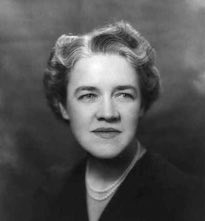She was the daughter of a barber in Skowhegan, Maine. Unable to afford college, she pursued a career in office work at the telephone company and a weekly newspaper until, at the age of thirty-four, she married Clyde Harold Smith, a prominent Republican politician twenty-one years her senior.
When Smith was elected to the House of Representatives, Margaret served as his secretary. After he suffered a heart attack in 1940, she filed for the primary in his place, intending to withdraw when he recovered. His unexpected death left her heir to the Republican nomination, which nearly guaranteed election in the state of Maine.
Smith went on to serve well and win repeated reelection in her own right. Her independent views were evident in her very first vote, defying
isolationist sentiment in her party to support the draft. In 1948 she went after the newly vacant Senate seat and won a hotly contested Republican primary with a low budget grassroots campaign. She went on to serve four full terms in the “most exclusive men’s club in the world,” the U.S. Senate becoming the first woman to serve in both houses and the first woman to represent Maine in either house. She was famous for her early challenge of McCarthyism.
In 1950, she and six other Senators issued a “declaration of conscience” denouncing “hate and character assassination,” though neglecting to mention Joseph McCarthy by name. She consistently supported a strong national defense and became known as the “Mother of the WAVES” for her efforts to advance the position of women in the Navy. She was a staunch cold warrior, charging that President Kennedy was afraid to stand up to the Communists and voting against the nuclear test ban treaty. In 1970 she issued a second “declaration of conscience,” deploring the hatred and extremism of the Vietnam War era.

